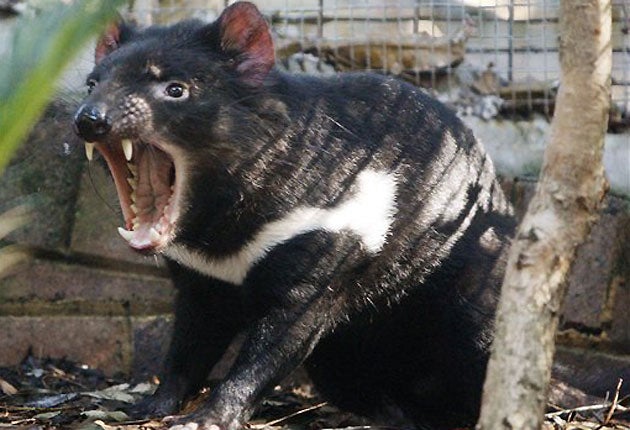Tasmanian devils listed as endangered

Your support helps us to tell the story
From reproductive rights to climate change to Big Tech, The Independent is on the ground when the story is developing. Whether it's investigating the financials of Elon Musk's pro-Trump PAC or producing our latest documentary, 'The A Word', which shines a light on the American women fighting for reproductive rights, we know how important it is to parse out the facts from the messaging.
At such a critical moment in US history, we need reporters on the ground. Your donation allows us to keep sending journalists to speak to both sides of the story.
The Independent is trusted by Americans across the entire political spectrum. And unlike many other quality news outlets, we choose not to lock Americans out of our reporting and analysis with paywalls. We believe quality journalism should be available to everyone, paid for by those who can afford it.
Your support makes all the difference.The Tasmanian devil, a snarling fox-sized marsupial made notorious by its Looney Tunes cartoon namesake Taz, was listed in Australia as an endangered species today because of a contagious cancer that has wiped out most of the wild population.
The upgrade from "vulnerable" under Australian environmental law entitles the world's largest marsupial carnivore to greater protection in the island state of Tasmania, Environment Minister Peter Garrett said in a statement.
Devils do not exist in the wild outside Tasmania, although mainland zoos are breeding captive populations as a strategy against total extinction.
Their numbers have declined by 70 percent since the facial cancer was first reported in 1996. The disease is caused by bites inflicted on each other's faces as part of a bizarre mating ritual or while squabbling over food. It causes grotesque facial tumors that eventually prevent them from feeding, leading to starvation within months.
"Strong action is being taken to find out more about this disease and to stop its spread," Garrett said.
The government has already committed 10 million Australian dollars ($7.8 million) over five years to research the disease and support captive breeding programs, but scientists say more is needed.
Hamish McCallum, senior scientist in the government-backed devil rescue program, said the main advantage of the endangered listing was that it acknowledged the serious threat the species faced.
"I'm hoping that it might cause a philanthropist or corporate sponsors to say: 'Hey, this is serious' and to chip in some serious money," McCallum said.
"I guess my optimism has diminished a little bit, but I'm still hopeful that of the various angles we're looking at, one of them will come through and we won't lose the animals in the wild," he added.
Warner Bros., which owns Taz, and CNN founder Ted Turner, who started the Cartoon Network, have helped fund the fight against the disease.
McCallum fears that devils could be extinct in the wild in 20 years. He estimates there are as few as 10,000 now, as the cancer continues to spread west and south across Tasmania.
Scientists have been working since the disease first emerged to save the animals, known for their powerful jaws and bloodcurdling growl.
Programs to try to save them include plans to relocate breeding pairs to island sanctuaries and to protect disease-free populations on peninsulas with devil-proof fences several miles (kilometers) long.
McCallum said he is frustrated that disagreement among scientists has prevented the sanctuaries from being established on islands off Tasmania. Some scientists fear the introduced devils would threaten endangered birds.
Scientists had hoped to find a genetic solution to the disease through a young devil who showed signs of natural immunity in laboratory tests. But that devil last year contracted a second, mutated strain of the cancer.
A test that can potentially detect the disease in a devil before it becomes contagious is in trials. While scientists hope this will help keep small wild populations disease free, the test is not yet proven to be accurate.
Join our commenting forum
Join thought-provoking conversations, follow other Independent readers and see their replies
Comments